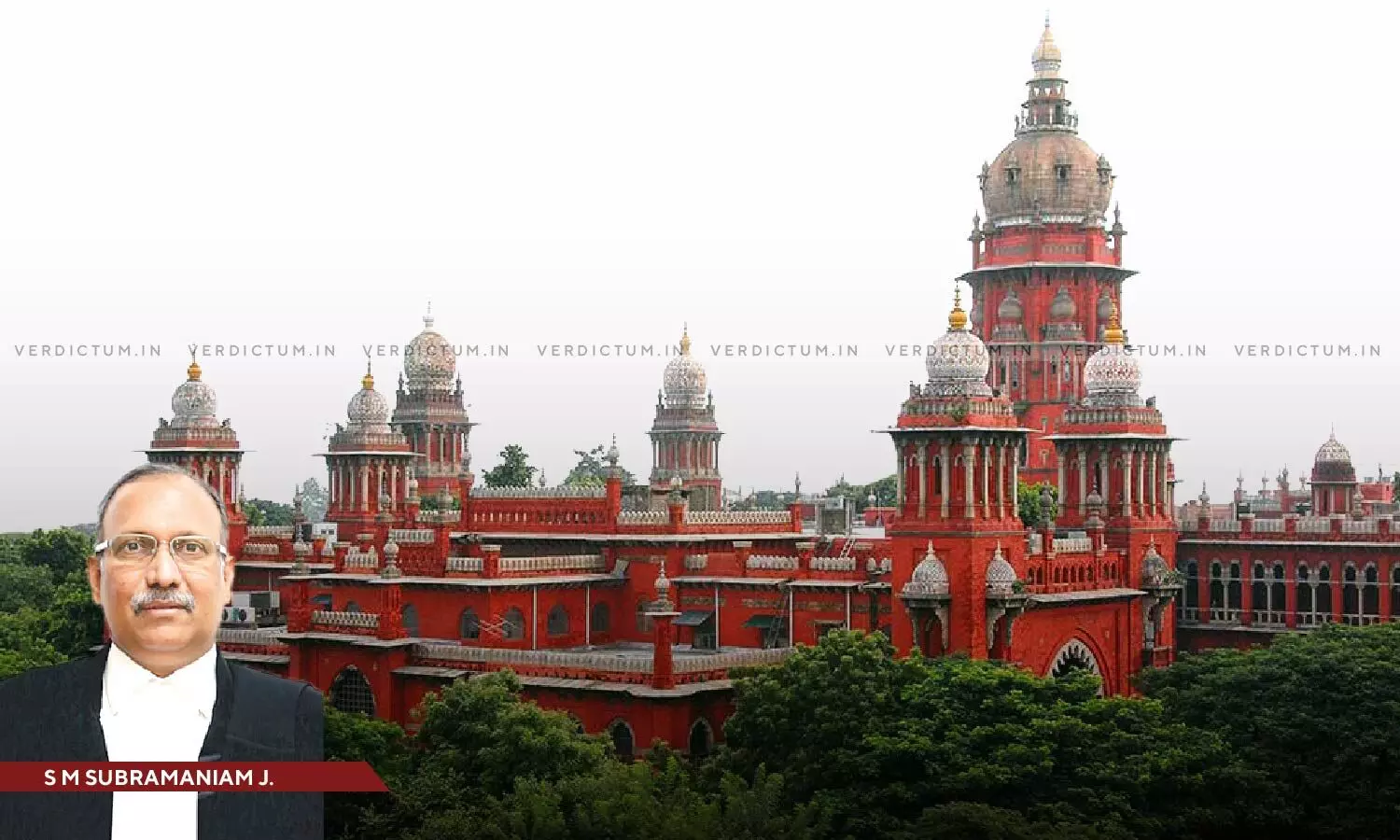
No Tolerance For Colonial Practices: Madras HC Orders Probe Into Use Of Police Personnel For Personal Work By Prison Authorities
 |
|The Madras High Court has directed the Tamil Nadu Government to conduct an elaborate enquiry and initiate all appropriate actions against the prison authorities, who have engaged the uniformed personnel/ public servants for their residential works or personal works, in all the prisons across the State.
The single-bench of Justice S.M. Subramaniam observed, ".....we direct the Additional Chief Secretary/Principal Secretary to Government, Home, Prohibition and Excise Department, the first respondent to conduct an eloborate enquiry either with the assistance of CBCID police or by getting necessary inputs from the Intelligence Wing and initiate all appropriate actions against the prison authorities, who have engaged the uniformed personnel/public servants for their residential works or personal works, in all the prisons across the State. On such identification, suitable orders are to be passed by the first respondent withdrawing all those uniformed personnel and deploy them for prison duties as per the prison rules and the Government Orders in force."
The petitioner was represented by Advocate M.Radha Krishnan and Advocate P.Pugalenthi while the respondent was represented by Additional Public Prosecutor R.Muniyapparaj.
The petitioner had raised a complaint mainly about the unhygienic situation prevailing inside the Central Prison-II, Puzhal, Chennai and the inadequacy of minimum facilities provided to the prisoners. In another complaint raised, he stated that as per the Model Prison Manual there should be one guard for every six prisoners. He added that in Central Prison-II at Puzhal, Chennai, 203 Prison Warder posts are sanctioned and these Warders are to be allotted duty in three shifts with 60 Warders per shift. However, the petitioner stated that only 15 Warders are available per shift, which is posing not only threat to the prisoners, but also would pave way for other issues amongst the prisoners. His concern was that conflict between the prisoners and the Warders are frequently happening inside the prison on account of frustration of the Jail Warders, as they are made to work for long hours beyond the shift hours. Ironically, he stated that except 15 Warders per shift posted inside the prison, the remaining guards/uniformed personnel are deployed to work at the residences of the prison authorities including the DGP, IG, DIG, SP, Addl.SP and three Jailors.
The Court at the outset noted that organized or structural misconducts or offences leading to unconstitutionality result not only in violation of individual rights, but to be construed as structural violations.
"When there are common allegations against the prison authorities of this nature or abuse of power and utilise the uniformed personnel for their residential works, undoubtedly, it would affect the public service to be provided to the citizens in general," the court added.
The Court cited its decision in U.Manickavel v. State represented by the Secretary, Home, Prohibition and Excise Department wherein it dealt with similar issue.
"It is the duty of this Court to remind that the police authorities/prison authorities are public servants and they have been paid decent salary from the tax payers' money. Other facilities are also provided by the Government for effective performance of their public duties. Thus they are expected to avail the benefits whatever admissible under the relevant rules and in the event of abuse of official position, they are liable for prosecution and for initiation of disciplinary proceedings for misconducts," the court observed.
It said that the colonial practice of abuse of public servants at no circumstances be tolerated by the Constitutional Courts. The prison authorities are public servants and they are expected to serve for the benefit of the public and not to follow any colonial practice of deploying the uniformed personnel for their residential works. The Court stressed that they are not only committing unconstitutionality, but committing an offence against the public, for which they are liable to be prosecuted under the relevant service rules and the laws in force.
"Deployment of uniformed personnel in the residences of the prison authorities are resulting in dereliction of duty and/or lapses in prison administration. When 203 sanctioned post of Warders are available in the Central Prison-II, Puzhal at Chennai alone, only 15 Warders per shift are deployed for public duties, instead of 60 Warders per shift. Large number of Warders are deployed to perform household works in the residences of the jail authorities. The colonial practice of abuse of public servants at no circumstances be tolerated by the Constitutional Courts," the court stated.
It pointed out that even after several instructions and/or orders from this Court, the practice of deploying the uniformed personnel in the residences of higher police authorities and prison authorities are not completely washed away and therefore stringent actions are required to be taken by the Government so as to ensure that the public servants are utilized only for the welfare of the public and not to perform household works in the residences of the authorities
The petition was accordingly allowed.
Cause Title: Sujatha vs. The Additional Chief Secretary to Government
Appearances:
Petitioner- Advocate M.Radha Krishnan and Advocate P.Pugalenthi
Respondent- Additional Public Prosecutor R.Muniyapparaj
Click here to read/ download the order: